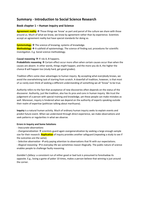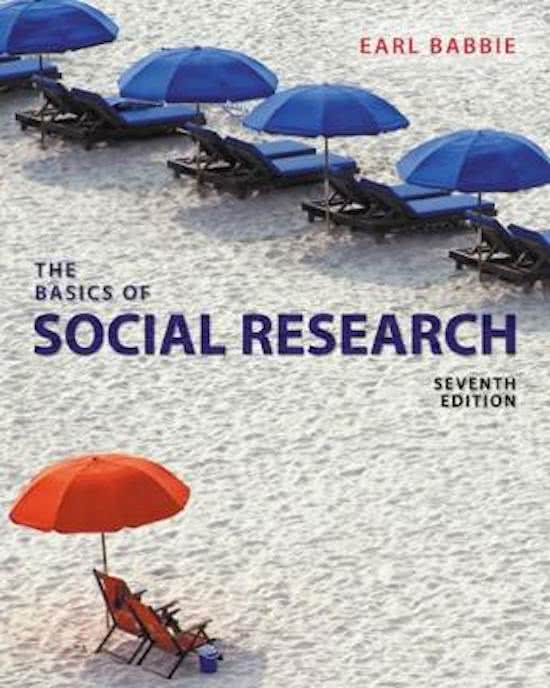Summary - Introduction to Social Science Research
Book chapter 1 – Human Inquiry and Science
Agreement reality Those things we ‘know’ as part and parcel of the culture we share with those
around us. Much of what we know, we know by agreement rather than by experience. Scientists
accept an agreement reality but have special standards for doing so.
Epistemology The science of knowing; systems of knowledge.
Methodology A subfield of epistemology. The science of finding out; procedures for scientific
investigation. E.g. Social science methodology.
Causal reasoning If I do A, B happens.
Probabilistic reasoning Certain effect occur more often when certain causes occur than when the
causes are absent. In other words, things might happen, and the more you do A, the higher the
chance B will happen too (study hard, get good grades).
Tradition offers some clear advantages to human inquiry. By accepting what everybody knows, we
avoid the overwhelming task of starting from scratch. A downfall of tradition, however, is that most
of us rarely even think of seeking a different understanding of something we all “know” to be true.
Authority refers to the fact that acceptance of new discoveries often depends on the status of the
discoverer. Authority, just like tradition, also has its pros and cons in human inquiry. We trust the
judgement of a person with special training and knowledge, yet these people can make mistakes as
well. Moreover, inquiry is hindered when we depend on the authority of experts speaking outside
their realm of expertise (politician talking about marihuana).
Inquiry is a natural human activity. Much of ordinary human inquiry seeks to explain events and
predict future event. When we understand through direct experience, we make observations and
seek patterns or regularities in what we observe.
Errors in Inquiry and Some Solutions
- Inaccurate observations
- Overgeneralization scientists guard again overgeneralization by seeking a large enough sample
size for their research. Replication of inquiry provides another safeguard (repeating a study to see if
the outcomes are the same).
- Selective observation only paying attention to observations that fit with our expectations.
- Illogical reasoning In everyday life we sometimes reason illogically. The public nature of science
enables people to challenge faulty reasoning.
Gambler’s fallacy: a consistent run of either good or bad luck is presumed to foreshadow its
opposite. E.g., losing a game of poker 10 times, makes a person believe that winning is just around
the corner.
,The foundations of social science
The two pillars of science are (1) logic and (2) observation.
A scientific understanding must (1) make sense and (2) correspond with what we observe.
These elements relate to three very important aspects of science:
- Scientific theory deals with logic;
- Data collection deals with observation;
- And data analysis deals with patterns and compares these.
Social science = Theory + Data collection + Data analysis
The purpose of social research: exploring, describing, and explaining social phenomena.
Social science has to do with how things are, and why. It does not deal with what should be. Science
cannot settle debates on value, opinion or belief (E.g. what religion is better?)
Theory A systematic explanation for the observations that relate to a particular aspect of life.
Theories are written in the language of variables.
Fundamental bases social science builds theories upon
- Social regularities
- Aggregates (samenvoeging, totaal), not individuals
- Concepts and variables
Three objections are sometimes raised in regard to social regularities.
- The charge of triviality: ‘common wisdom’, obvious truths (e.g., Republicans vote for Republicans).
Fool’s experiment by Charles Darwin: research in which Darwin tested things that everyone else
‘already knows’.
- There are always exceptions to the regularity
- People could interfere: not a big threat, yet people could sabotage observations on purpose just to
annoy observers or when trying to act ‘funny’.
Also, social research has a recursive quality, which means that what we learn can end up changing
things, and what we learned will no longer be true.
Social scientists try not to explain people, but the systems in which people operate, which in turn
explains why people do what they do. The elements in such a system are not people but variables.
Variables vary; some people/things are more of this, and less of that.
Variables are composed of attributes (or: values). Theories often describe the relationship we might
logically expect among variables.
Variables A logical set of attributes. The variable sex is made up of the attributes male and female.
Other examples of a variable include occupation, social class, age, race, political views or gender.
Attribute A characteristic of a person or a thing. E.g., female, Asian, dishonest, intelligent, etc.
Independent variable A variable with values that are not problematical in an analysis but are
taken as simply given. An independent variable is presumed to cause or determine a dependent
variable.
Dependent variable A variable assumed to depend on or be caused by another (called the
independent variable).
In causal explanation, the presumed cause is the independent variable, and the affected variable
is the dependent variable.
, Idiographic explanation An approach to explanation in which we seek to exhaust the idiosyncratic
causes of a particular condition or event. E.g., imagine listing all the reasons why you chose to attend
your particular college. Idio = unique, separate, distinct. Qualitative explanation.
Nomothetic explanation An approach to explanation in which we seek to identify a few causal
factors that generally impact a class of conditions or events. E.g., imagine two or three key factors
which made you choose your particular college, such as proximity, reputation, etc. Quantitative
explanation.
Whereas idiographic explanations seek to present a full understanding of specific cases using all
relevant factors, nomothetic explanations seek to present a general understanding of many cases,
which are not necessarily complete.
Idiographic explanation of causation is relatively complete, whereas a nomothetic explanation is
probabilistic and usually incomplete.
Induction The logical model in which general principles are developed from specific observations.
Deduction The logical model in which specific expectations of hypotheses are developed on the
basis of general principles.
Deduction begins with an expected pattern that is tested against observations, whereas induction
begins with observations and seeks to find a pattern within them.
The underlying logic of traditional science implicitly suggests a deterministic cause-and-effect model
in which individuals have no choice, although researchers do not say, nor necessarily believe, that.
Determinism vs. agency: Are humans determined by their particular environment or do they feel and
act out of their personal choice (agency)? Each of us possess considerable free choice or agency, but
we allow ourselves to be controlled by environmental forces and factors.
Agency choice, free will
‘I couldn’t date someone who smokes’
‘I couldn’t tell my mother that’
You could do any of these things, but you choose not to. You rarely take responsibility for such a
decision, as it is often blamed on external forces (the professor gives an exam on Monday, so I
cannot join the party of Sunday. It is his/her fault).
An important ability in the world of social research is tolerance for ambiguity the ability to hold
conflicting ideas in your mind simultaneously, without denying or dismissing any of them.
The distinction between quantitative and qualitative data is the distinction between numerical and
non-numerical data. Both types of data are useful for different research purposes.






